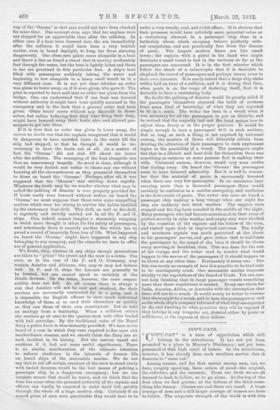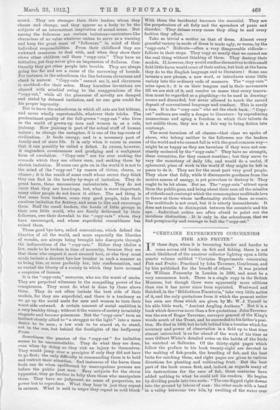COPY-CATS.
" COPY-CAT " is a term of opprobrium which still belongs to the schoolroom. It has not yet been promoted to a place in Murray's Dictionary ; not yet been presented at that high court of letters. In the schoolroom, however, it has already done such excellent service that it deserves to "come out
Among women, and for that matter among men, too, we have, roughly speaking, three orders of mind—the original, the reflective, and the eccentric. From our birth we are all doomed to lead, to follow, or to go alone. At the top of the first class we find genius ; at the bottom of the third some- thing like lunacy. Classes one and three are small. A large average of men and a still larger average of women are born to follow. The corporate strength of the world is with this crowd. They are stronger than their leaders whom they choose and change, and they appear as a body to be the subjects of an intermittent inspiration of sound sense. But among the followers are certain imitators—caricature-like characters of no value whatever unless to serve as a warning
and keep the great mass of "followers" in mind of their individual responsibilities. From their childhood they are awkward creatures to deal with, and when they show their claws other children call them "copy-cats." They have no initiative, yet they never give an impression of dullness. Con- tinually they get other people into trouble. They are always going too far and are a cause of the narrowing of bounds. For instance, in the schoolroom the line between cleverness and cheek is narrow. " Copy-cats " cannot see it, and cleverness is snubbed—for their sakes. Many harmless inventions are classed with mischief owing to the exaggerations of the "copy-cat," while all the pleasures of novelty are damped and staled by debased imitation, and no one gets credit for bis proper ingenuity.
But to leave the schoolroom in which all cats are but kittens, and never wholly reprehensible, whatever their tricks. The predominant quality of the full-grown " copy-oat " who lives in the world of grown-up men and women is, as a rule, jealousy. Now jealousy is part of the actual stuff of human nature ; to change the metaphor, it is one of the tap-roots of civilization. It feeds energy, and is a necessary part of family and of state life. It is only when it exists in excess that it can pos4ibly be called a defect. In excess, however, it engenders covetousness and grudging and a malignant form of emulation. " Copy-cats " are for ever seeking the rewards which they see others earn, and seeking them by slavish imitation. If some one gets on in the world it is not to the mind of the " copy-cat " by reason of virtue, charm, or chance ; it is the result of some craft whose secret they think they can find in the tawdry by-ways of imitation. They do great harm, these unconscious caricaturists. They do not know that they are humbugs, but, what is more important, many other people do not know it either. The sad thing is that some born leaders, some very good people, take their emulous imitation for flattery, and seem to like and encourage them. Half the small leaders, the heads of little groups in their own little world, who are finally dethroned by their followers, owe their downfall to the " copy-cats" whom they have encouraged, and whose superficial resemblance has ruined them.
Those good bye-laws, called conventions, which defend the liberties of all the world, and more especially the liberties of -women, are always being brought into disrepute through the indiscretions of the " copy-cats." Either they idolize a law, made to be broken in time of necessity, because they see that those who respect it most succeed heat, or else they must needs imitate a discreet bye-law breaker in such a manner as to bring him, or more probably her, into condemnation, and so curtail the liberty of a society in which they have aroused a suspicion of licence.
It is the "copy-cats," moreover, who are the worst of snobs. They are perpetual witnesses to the compelling power of the conspicuous. They must do what is done by those above them. They do not often imitate the best side of their models, for they are superficial, and there is a tendency as we go up the social scale for men and women to turn their worst side outward. A certain amount of social ambition is a very healthy thing; without it the waters of society invariably stagnate and become poisonous. But the "copy-cats" turn an instinct closely allied to "a struggle to the light" into a mere desire to be seen ; a low wish to be stared at to stand, not in the sun, but behind the footlights of the halfpenny Press.
Sometimes the passion of the " copy-cat " for imitation seems to be uncontrollable. They do what they see done, even when by doing so they risk an injury to themselves. They would jump over a precipice if only they did not have to go first; the only difficulty in commanding them is to hold and restrict their attention. Sad instances of the harm these fools can do when spellbound by unscrupulous persons are before the public just now. Easy subjects for the clever hypnotist, they go further in folly than those who manipulate them. They have no judgment, no sense of proportion, no power but to reproduce. What they hear in jest they repeat in earnest. What is said in anger they repeat in cold blood.
With them the incidental becomes the essential. They are the perpetrators of all folly and the spreaders of panic and disorder. They debase every cause they cling to and every fashion they affect.
Take so trivial a matter as that of dress. Almost every graceful variety in mode of dress is made ugly, or worse, by the "copy-cats." Ridicule—often a very disagreeable ridicule— follows in their steps. They copy so nearly that we cannot see the real thing without thinking of them. They destroy their models. If, however, they would confine themselves to this small field little harm would come of their antics, but look at the harm they do to the English language and to literature ! Some one invents a new phrase, a new word, or introduces some little variety into the ordinary code of manners. The " copy-cats " seize upon it; it is on their tongues and in their movements till we are sick of it, and resolve en masse that every innova- tion must be regarded as a plaything—to be used in drawing- rooms and discarded, but never allowed to touch the sacred deposit of conventional language and conduct. This is surely a loss. It is the "copy-cats" who set the clock back. " Copy- cat" authors are really a danger to literature : by reproducing mannerisms and aping a freedom to which their talents do not entitle them, they are in a fair way to bring fiction into contempt.
The most harmless of all classes—that class we spoke of above, who belong neither to the followers nor the leaders of the world and who cannot fall in with the good common way— might be as happy as they are harmless if they were not con- stantly molested by the " copy-cats." They have no strength, these eccentrics, for they cannot combine ; but they serve to vary the monotony of daily life, and would do a useful, if ephemeral, piece of work in the world if they might be left in peace to do it. They are for the most part very good people. They show that folly, while it disconnects goodness from the motive source of energy, is yet powerless to destroy it. They ought to be let alone. But no. The " copy-cats " attract upon them the public gaze, and bring about their ears all the missiles of ridicule and contempt which the commonplace multitude love to throw at those whose ineffectuality strikes them as comic. The multitude is not cruel, but it is utterly inconsiderate. It does not trouble to distinguish between the eccentric and his ape. Individual critics are often afraid to point out the invidious distinction. It is only in the schoolroom that we find perspicacity and courage to boll the " copy-oat."







































 Previous page
Previous page